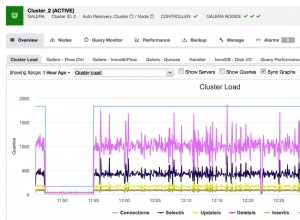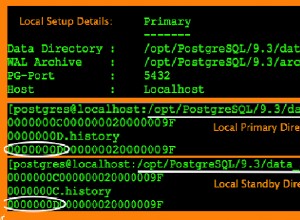Très bien, j'ai écrit une migration pour y parvenir pour mon propre système.
-
Il vous permet de spécifier éventuellement un nom de connexion pour référencer une connexion autre que celle par défaut.
-
Il obtient la liste des tables de la base de données de la connexion en utilisant un
SHOW TABLESrequête. -
Il parcourt ensuite chaque table et met à jour toutes les colonnes de type chaîne/caractère avec le nouveau jeu de caractères et le nouveau classement.
-
J'ai fait en sorte qu'un rappel doit être fourni pour déterminer si une colonne doit ou non avoir sa longueur modifiée à la nouvelle longueur fournie. Dans mon implémentation,
VARCHARetCHARles colonnes avec des longueurs supérieures à 191 sont mises à jour pour avoir une longueur de 191 pendant la migration vers le haut etVARCHARetCHARles colonnes d'une longueur exacte de 191 sont mises à jour pour avoir une longueur de 255 lors de la migration inverse/vers le bas. -
Une fois que toutes les colonnes de chaînes/caractères ont été mises à jour, quelques requêtes seront exécutées pour modifier le jeu de caractères et le classement de la table, en convertissant tous les classements restants en un nouveau, puis pour modifier le jeu de caractères et le classement par défaut de la table.
-
Enfin, le jeu de caractères et le classement par défaut de la base de données seront modifiés.
Remarques
-
À l'origine, j'ai essayé de simplement convertir les tables au nouvel encodage, mais j'ai rencontré des problèmes avec les longueurs de colonne. 191 caractères est la longueur maximale des caractères dans
utf8mb4lors de l'utilisation d'InnoDB dans ma version de MySQL/MariaDB et que la modification du classement de la table provoquait une erreur. -
Au début, je voulais seulement mettre à jour les longueurs à la nouvelle longueur, mais je voulais aussi fournir une fonction de restauration, donc ce n'était pas une option car dans la méthode inverse, j'aurais défini les longueurs des colonnes qui étaient
utf8mb4à 255, ce qui aurait été trop long, j'ai donc choisi de changer également le classement. -
J'ai ensuite essayé de changer simplement la longueur, le jeu de caractères et le classement de
varcharetcharcolonnes qui étaient trop longues, mais dans mon système, cela entraînait des erreurs lorsque j'avais des index multi-colonnes qui incluaient de telles colonnes. Apparemment, les index multi-colonnes doivent utiliser le même classement. -
Une remarque importante sur ce point, c'est que la migration inverse/vers le bas ne sera pas parfaite à 100 % pour tout le monde. Je ne pense pas qu'il serait possible de le faire sans stocker des informations supplémentaires sur les colonnes d'origine lors de la migration. Donc, mon implémentation actuelle pour la migration inverse/vers le bas consiste à supposer que les colonnes de longueur 191 étaient à l'origine 255.
-
Une remarque tout aussi importante sur ceci est que cela changera aveuglément les classements de toutes les colonnes de chaîne/caractère vers le nouveau classement, quel que soit le classement d'origine, donc s'il y a des colonnes avec des classements différents, elles seront toutes converties au nouveau et l'inverse fera l'affaire de même, les originaux ne seront pas conservés.
<?php
use Illuminate\Database\Migrations\Migration;
class UpgradeDatabaseToUtf8mb4 extends Migration
{
/**
* Run the migrations.
*
* @return void
*/
public function up()
{
$this->changeDatabaseCharacterSetAndCollation('utf8mb4', 'utf8mb4_unicode_ci', 191, function ($column) {
return $this->isStringTypeWithLength($column) && $column['type_brackets'] > 191;
});
}
/**
* Reverse the migrations.
*
* @return void
*/
public function down()
{
$this->changeDatabaseCharacterSetAndCollation('utf8', 'utf8_unicode_ci', 255, function ($column) {
return $this->isStringTypeWithLength($column) && $column['type_brackets'] == 191;
});
}
/**
* Change the database referred to by the connection (null is the default connection) to the provided character set
* (e.g. utf8mb4) and collation (e.g. utf8mb4_unicode_ci). It may be necessary to change the length of some fixed
* length columns such as char and varchar to work with the new encoding. In which case the new length of such
* columns and a callback to determine whether or not that particular column should be altered may be provided. If a
* connection other than the default connection is to be changed, the string referring to the connection may be
* provided as the last parameter (This string will be passed to DB::connection(...) to retrieve an instance of that
* connection).
*
* @param string $charset
* @param string $collation
* @param null|int $newColumnLength
* @param Closure|null $columnLengthCallback
* @param string|null $connection
*/
protected function changeDatabaseCharacterSetAndCollation($charset, $collation, $newColumnLength = null, $columnLengthCallback = null, $connection = null)
{
$tables = $this->getTables($connection);
foreach ($tables as $table) {
$this->updateColumnsInTable($table, $charset, $collation, $newColumnLength, $columnLengthCallback, $connection);
$this->convertTableCharacterSetAndCollation($table, $charset, $collation, $connection);
}
$this->alterDatabaseCharacterSetAndCollation($charset, $collation, $connection);
}
/**
* Get an instance of the database connection provided with an optional string referring to the connection. This
* should be null if referring to the default connection.
*
* @param string|null $connection
*
* @return \Illuminate\Database\Connection
*/
protected function getDatabaseConnection($connection = null)
{
return DB::connection($connection);
}
/**
* Get a list of tables on the provided connection.
*
* @param null $connection
*
* @return array
*/
protected function getTables($connection = null)
{
$tables = [];
$results = $this->getDatabaseConnection($connection)->select('SHOW TABLES');
foreach ($results as $result) {
foreach ($result as $key => $value) {
$tables[] = $value;
break;
}
}
return $tables;
}
/**
* Given a stdClass representing the column, extract the required information in a more accessible format. The array
* returned will contain the field name, the type of field (Without the length), the length where applicable (or
* null), true/false indicating the column allowing null values and the default value.
*
* @param stdClass $column
*
* @return array
*/
protected function extractInformationFromColumn($column)
{
$type = $column->Type;
$typeBrackets = null;
$typeEnd = null;
if (preg_match('/^([a-z]+)(?:\\(([^\\)]+?)\\))?(.*)/i', $type, $matches)) {
$type = strtolower(trim($matches[1]));
if (isset($matches[2])) {
$typeBrackets = trim($matches[2]);
}
if (isset($matches[3])) {
$typeEnd = trim($matches[3]);
}
}
return [
'field' => $column->Field,
'type' => $type,
'type_brackets' => $typeBrackets,
'type_end' => $typeEnd,
'null' => strtolower($column->Null) == 'yes',
'default' => $column->Default,
'charset' => is_string($column->Collation) && ($pos = strpos($column->Collation, '_')) !== false ? substr($column->Collation, 0, $pos) : null,
'collation' => $column->Collation
];
}
/**
* Tell if the provided column is a string/character type and needs to have it's charset/collation changed.
*
* @param string $column
*
* @return bool
*/
protected function isStringType($column)
{
return in_array(strtolower($column['type']), ['char', 'varchar', 'tinytext', 'text', 'mediumtext', 'longtext', 'enum', 'set']);
}
/**
* Tell if the provided column is a string/character type with a length.
*
* @param string $column
*
* @return bool
*/
protected function isStringTypeWithLength($column)
{
return in_array(strtolower($column['type']), ['char', 'varchar']);
}
/**
* Update all of the string/character columns in the database to be the new collation. Additionally, modify the
* lengths of those columns that have them to be the newLength provided, when the shouldUpdateLength callback passed
* returns true.
*
* @param string $table
* @param string $charset
* @param string $collation
* @param int|null $newLength
* @param Closure|null $shouldUpdateLength
* @param string|null $connection
*/
protected function updateColumnsInTable($table, $charset, $collation, $newLength = null, Closure $shouldUpdateLength = null, $connection = null)
{
$columnsToChange = [];
foreach ($this->getColumnsFromTable($table, $connection) as $column) {
$column = $this->extractInformationFromColumn($column);
if ($this->isStringType($column)) {
$sql = "CHANGE `%field%` `%field%` %type%%brackets% CHARACTER SET %charset% COLLATE %collation% %null% %default%";
$search = ['%field%', '%type%', '%brackets%', '%charset%', '%collation%', '%null%', '%default%'];
$replace = [
$column['field'],
$column['type'],
$column['type_brackets'] ? '(' . $column['type_brackets'] . ')' : '',
$charset,
$collation,
$column['null'] ? 'NULL' : 'NOT NULL',
is_null($column['default']) ? ($column['null'] ? 'DEFAULT NULL' : '') : 'DEFAULT \'' . $column['default'] . '\''
];
if ($this->isStringTypeWithLength($column) && $shouldUpdateLength($column) && is_int($newLength) && $newLength > 0) {
$replace[2] = '(' . $newLength . ')';
}
$columnsToChange[] = trim(str_replace($search, $replace, $sql));
}
}
if (count($columnsToChange) > 0) {
$query = "ALTER TABLE `{$table}` " . implode(', ', $columnsToChange);
$this->getDatabaseConnection($connection)->update($query);
}
}
/**
* Get a list of all the columns for the provided table. Returns an array of stdClass objects.
*
* @param string $table
* @param string|null $connection
*
* @return array
*/
protected function getColumnsFromTable($table, $connection = null)
{
return $this->getDatabaseConnection($connection)->select('SHOW FULL COLUMNS FROM ' . $table);
}
/**
* Convert a table's character set and collation.
*
* @param string $table
* @param string $charset
* @param string $collation
* @param string|null $connection
*/
protected function convertTableCharacterSetAndCollation($table, $charset, $collation, $connection = null)
{
$query = "ALTER TABLE {$table} CONVERT TO CHARACTER SET {$charset} COLLATE {$collation}";
$this->getDatabaseConnection($connection)->update($query);
$query = "ALTER TABLE {$table} DEFAULT CHARACTER SET {$charset} COLLATE {$collation}";
$this->getDatabaseConnection($connection)->update($query);
}
/**
* Change the entire database's (The database represented by the connection) character set and collation.
*
* # Note: This must be done with the unprepared method, as PDO complains that the ALTER DATABASE command is not yet
* supported as a prepared statement.
*
* @param string $charset
* @param string $collation
* @param string|null $connection
*/
protected function alterDatabaseCharacterSetAndCollation($charset, $collation, $connection = null)
{
$database = $this->getDatabaseConnection($connection)->getDatabaseName();
$query = "ALTER DATABASE {$database} CHARACTER SET {$charset} COLLATE {$collation}";
$this->getDatabaseConnection($connection)->unprepared($query);
}
}
S'il vous plaît, s'il vous plaît, veuillez sauvegarder votre base de données avant d'exécuter ceci . Utilisez à vos risques et périls !




